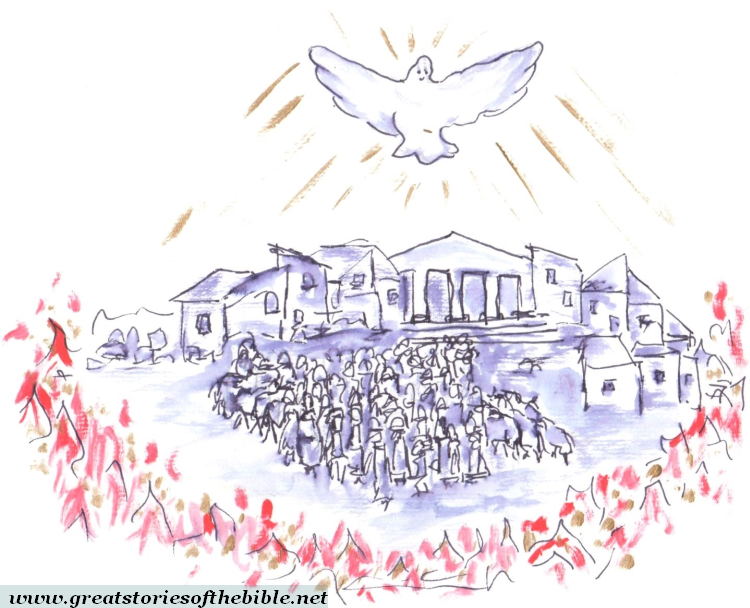Haggai (“my feast”) and Zechariah (“the Lord remembers”)
Not by might, nor by power, but by my Spirit
The Book of Haggai has only two chapters; the prophet operates in the time when the exiles are coming back from Babylon and they have to patiently rebuild Jerusalem and its Temple. We are «In the second year of Darius the king» of Persia (520 BC: Hag 1,1). The Lord rebukes the people for not having engaged in the restoration of the Temple: this is the cause of the absence of His blessing on the crops and more generally on the lives of those who returned home. «“You looked for much, and, behold, it came to little; and when you brought it home, I blew it away. Why?” says the LORD of hosts, “Because of my house that lies waste, while each of you is busy with his own house» (Hag 1,9). «In the seventh month, in the twenty-first day of the month [October of 520 BC], the Word of the LORD came by Haggai the prophet, saying, “Speak now to Zerubbabel, the son of Shealtiel, governor of Judah, and to Joshua, the son of Jehozadak, the high priest, and to the remnant of the people, saying, ‘Who is left among you who saw this house in its former glory? How do you see it now? Isn’t it in your eyes as nothing? Yet now be strong, Zerubbabel,’ says the LORD. ‘Be strong, Joshua, son of Jehozadak, the high priest. Be strong, all you people of the land,’ says the LORD, ‘and work, for I am with you,’ says the LORD of hosts. This is the word that I covenanted with you when you came out of Egypt, and my Spirit lived among you. ‘Do not be afraid.’ For this is what the LORD of hosts says: ‘Yet once, it is a little while, and I will shake the heavens, the earth, the sea, and the dry land; and I will shake all nations. The precious things of all nations will come, and I will fill this house with glory, says the LORD of hosts. The silver is mine, and the gold is mine,’ says the LORD of hosts. ‘The latter glory of this house will be greater than the former,’ says the LORD of hosts; ‘and in this place will I give peace,’ says the LORD of hosts.”» (Hag 2,1-9). The main characters are two: Zerubbabel, who belongs to King David’s offspring and gives rise to the hope of a renewal of the messianic hopes (see the Lord’s promise in 2Sam7), and Joshua the high priest. Due to the subsequent historical events, the political power will stay in the high priests’ hand: David’s throne remains unoccupied (see the posts about Ezra and Nehemiah and about Judas Maccabaeus).
Zechariah is a contemporary of Haggai: the first part of his Book (chapters 1-8) is about the restoration of Jerusalem and the Temple. In his visions the prophet announces a great future: «‘Jerusalem will be inhabited as villages without walls, because of the multitude of men and livestock in it. For I,’ says the LORD, ‘will be to her a wall of fire around it, and I will be the glory in the midst of her» (Zech 2,8-9). 
This will happen «‘Not by might, nor by power, but by my Spirit,’ says the LORD of hosts» (Zech 4,6); Joshua and Zerubbabel are «the two anointed ones who stand by the Lord of the whole earth» (Zech 4,14). Zerubbabel is even called «Branch» (Zech 6,12; see Jer 23,5; 33,15); all the foreign nations will recognize the Lord’s powerful intervention: «In those days, ten men will take hold, out of all the languages of the nations, they will take hold of the skirt of him who is a Jew, saying, ‘We will go with you, for we have heard that God is with you.’» (Zech 8,23). The second part of the Book (chapters 9-14) gathers heterogeneous oracles; furthermore, it does not mention Zechariah, Joshua, Zerubbabel nor the reconstruction of Jerusalem: those texts probably date to the following century (IV BC), in the Hellenistic period. I quote some of them that the New Testament recalls and attributes to Jesus. «Rejoice greatly, daughter of Zion! Shout, daughter of Jerusalem! Behold, your king comes to you! He is righteous, and having salvation; lowly, and riding on a donkey, even on a colt, the foal of a donkey. I will cut off the chariot from Ephraim, and the horse from Jerusalem; and the battle bow will be cut off; and he will speak peace to the nations: and his dominion will be from sea to sea, and from the River to the ends of the earth» (Zech 9,9-10; the donkey is the ride of princes and kings, for example Solomon: 1Kgs 1,38; see Jesus in Matt 21,5 on the Palm Sunday). The strong critic against a cruel and unworthy ruling class produces the text about the «thirty pieces of silver» (Zech 11,4-17: the price of a slave) that the Evangelist Matthew reinterprets as the money Judas received to betray Jesus (Matt 27,3-10). There is the mysterious oracle about a «pierced» whose death will bring salvation to the people: «I will pour on the house of David, and on the inhabitants of Jerusalem, the spirit of grace and of supplication; and they will look to me whom they have pierced; and they shall mourn for him, as one mourns for his only son, and will grieve bitterly for him, as one grieves for his firstborn. In that day there will be a great mourning in Jerusalem, like the mourning of Hadadrimmon [probably a foreign god who dies and rises following the cycle of the seasons] in the valley of Megiddon» (Zech 12,10-11). Evangelist John recalls these verses to describe Jesus’ Passion (19,37).
In the next post we will conclude the Book of the Twelve Prophets with Malachi.